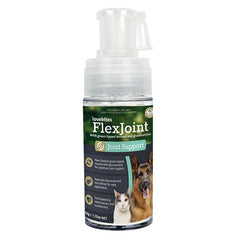
Arthritis is a common condition that affects pets, particularly as they age. Being aware of what the symptoms of arthritis are can help you and your vet reach a diagnosis sooner and start on a course of treatment to manage this condition.
It can cause pain, stiffness, and difficulty moving, which can impact their quality of life.
However, there are several treatment options available to help manage arthritis in pets. Learn about the causes, symptoms, and treatments for this condition to help your furry friend feel more comfortable and happy.
What is arthritis in pets?
Arthritis in pets is a condition that causes inflammation and pain in the joints. It can affect any joint in the body, but is most commonly seen in the hips, knees, elbows, and spine. Arthritis can be caused by a variety of factors, including genetics, injury, and wear and tear on the joints over time. It is more commonly seen in older pets, but can also affect younger animals.
What are the causes of arthritis in pets?
Arthritis in pets can be caused by a variety of factors, including genetics, injury, and wear and tear on the joints over time. Certain breeds of dogs, such as Labrador Retrievers and German Shepherds, are more prone to developing arthritis. Injuries, such as a torn ligament or broken bone, can also lead to arthritis later in life. Additionally, obesity can put extra strain on the joints and increase the risk of developing arthritis.
What are the symptoms of arthritis in pets?
The symptoms of arthritis in pets can vary depending on the severity of the condition. Some common signs include limping, stiffness, difficulty getting up or lying down, reluctance to jump or climb stairs, licking joints, and decreased activity levels.
Pets with arthritis may also show signs of pain, such as whimpering or crying when touched or moving in certain ways. If you suspect your pet may have arthritis, it’s important to consult with your veterinarian for proper diagnosis and treatment.
How is arthritis in pets diagnosed?
Arthritis in pets is typically diagnosed through a combination of physical examination, medical history, and diagnostic tests. Your veterinarian may perform a range of tests, including X-rays, blood tests, and joint fluid analysis, to help confirm the diagnosis and determine the severity of the condition. Once a diagnosis is made, your veterinarian can work with you to develop a treatment plan that may include medication, weight management, exercise, and other therapies to help manage your pet’s arthritis symptoms.
What are the treatment options for arthritis in pets?
Treatment options for arthritis in pets may include medication, weight management, exercise, and other therapies. Nonsteroidal anti-inflammatory drugs (NSAIDs) are commonly prescribed to reduce pain and inflammation in pets with arthritis. Your veterinarian may recommend this treatment in the form of Carprofen, Meloxicam and Previcox. These drugs work by reducing joint inflammation of the joint lining allowing greater function of the affected joint.
management, exercise, and other therapies. Nonsteroidal anti-inflammatory drugs (NSAIDs) are commonly prescribed to reduce pain and inflammation in pets with arthritis. Your veterinarian may recommend this treatment in the form of Carprofen, Meloxicam and Previcox. These drugs work by reducing joint inflammation of the joint lining allowing greater function of the affected joint.
Weight management is important for pets with arthritis, as excess weight can put additional stress on joints. Exercise can also be beneficial, but it’s important to work with your veterinarian to develop an exercise plan that is safe and appropriate for your pet’s condition. Other therapies such as acupuncture and physical therapy may also be recommended to help manage your pet’s arthritis symptoms.
How to modify your home to help a pet suffering with arthritis
By making some simple modifications to your home, you can support your pet and make their living conditions as comfortable and accessible as possible.
- Add a no slip rug - a cost effective modification for homes that have timber or tiled flooring. Rubber underlays are also available to help secure rugs.
- Pet Socks - Dog socks are a practical solution to prevent dogs from slipping on floorboards. Trixie Dog socks feature anti-slip rubber nodules on the base of each sock and are custom-made for dogs' paws from cotton and lycra.
great for senior dogs with mobility issues and to prevent dogs from licking their paws. Sizes available from extra small - large. - Joint supplements - Boost diet with antioxidants, glucosamine, and
supplements with Omega 3 essential oils. A simple way to get the right antioxidants in your dog is to use Paw Joint Protect Chews each day. - Diet Exercise and maintaining weight - Feed your pet a senior or mature formula of food. Some foods now feature added chondroitin sulfate and glucosamine.
- pet Buggy - An ideal addition to allow your pet to continue to enjoy the
benefits of the great outdoors and trips out with you. Purpose made for pet, the Ibiyaya Pet Buggy is designed to provide maximum comfort and convenience for both you and your pet. It features a spacious and well-ventilated cabin, a sturdy and durable frame, and a smooth-rolling wheel system that makes it easy to maneuver on any terrain outdoor adventures.

- Supportive bedding - Ensure that your pet has a bed that uses supportive foam or memory foam. Extra support for more senior dogs is important for their rest and recovery. A rectangular orthopeadic memory foam dog bed, designed for dogs that love sleeping stretched out & unrestricted in their sleeping position!
- Warm dog coat for winter - Older dogs tend to have a weaker immune system and may struggle to regulate their body temperature in extreme weather conditions. Senior dogs are prone to conditions that may require a winter coat, such as arthritis. Heat regulation may decline with age, making even a thick-coated dog uncomfortable in the cold.
- Consult your vet about disease modifying drugs for arthritis.
What is the difference between arthritis and osteoarthritis?
Arthritis and osteoarthritis are not exactly the same in dogs, although they are related. Arthritis is a general term that refers to inflammation of a joint, which can be caused by various factors such as injury, infection, immune-mediated diseases, or age-related wear and tear. On the other hand, osteoarthritis specifically refers to degeneration of joint cartilage and the underlying bone, often resulting from chronic wear and tear over time.
In dogs, osteoarthritis is the most common type of arthritis and is typically associated with aging and gradual degeneration of the joints. It can affect any joint in the body, but is commonly seen in weight-bearing joints such as hips, knees, elbows, and shoulders. Osteoarthritis in dogs is usually a progressive condition that can cause pain, stiffness, reduced mobility, and overall decreased quality of life. One in five Australian dogs will suffer from osteoarthritis at some stage of their life!
Arthritis, on the other hand, is a broader term that can encompass various types of joint inflammation in dogs, including infectious arthritis (caused by infection), immune-mediated arthritis (resulting from the immune system attacking the joints), and traumatic arthritis (due to injury). These types of arthritis may have different causes, symptoms, and treatments compared to osteoarthritis.
It's important to note that while arthritis and osteoarthritis are not exactly the same, they can often coexist in dogs, with osteoarthritis being a common form of arthritis in older dogs due to age-related degeneration of joint tissues. Proper diagnosis by a veterinarian is essential to determine the specific type of arthritis in dogs and to develop an appropriate treatment plan to manage the condition effectively.
Rheumatoid Arthritis in Pets
Arthritis in pets, specifically rheumatoid arthritis, is a condition where the immune system attacks healthy tissue, leading to the gradual deterioration of joint cartilage. While it is less common than osteoarthritis in dogs, it can affect multiple joints and is more prevalent in small or toy breeds. Treatment options for arthritis in pets may include medication, physical therapy, weight management, and joint supplements. It's important to consult with a veterinarian to determine the best course of action for your pet's specific needs.
© weknowpets 2023







